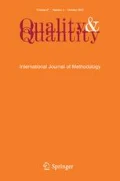Abstract
Recruitment of a large and reliable control group is a challenge in psychological survey based research. The effect of recruitment styles and age on response-rate, data quality, and individual differences were investigated in a control group for a postal survey of elderly bereaved people. This study was a direct reaction to the first recruitment attempt that had a 10% response rate. This study consisted of four groups of randomly selected elderly married people (65–81 years) receiving a postal questionnaire measuring depression, social support, coping style, adult attachment, life satisfaction, and personality factors. All groups were exposed to a set of general initiatives (customized introduction letter with university letterhead; self-addressed, prepaid envelope included; personally directed letter signed by the researcher; an assurance of confidentiality). Three groups were exposed to different specific initiatives (short non-sensitive questionnaire, recorded response, and monetary incentive independent of response) to increase the response-rate. The results indicated that general initiatives and information letters apparently increased the response-rate from 10 to 31%. Monetary incentive had the highest response-rate (51%), good data quality, and no sampling bias in individual differences. This method can be highly recommended in future control group recruitment.
Similar content being viewed by others
References
Addington-Hall J., Walker L., Jones C., Karlsen S., McCarthy M.: A randomised controlled trial of postal versus interviewer administration of a questionnaire measuring satisfaction with, and use of, services received in the year before death. J. Epidemiol. Community Health 52(12), 802–807 (1998)
Aluja A., García O., Rossier J., García L.F.: Comparison of the NEO-FFI, the NEO-FFI-R and an alternative short version of the NEO-PI-R (NEO-60) in Swiss and Spanish samples. Pers. Individ. Differ. 38(3), 591–604 (2005)
Beck A.T., Steer R.A., Garbin M.G.: Psychometric properties of the Beck Depression Inventory: twenty-five years of evaluation. Clin. Psychol. Rev. 8(1), 77–100 (1988)
Collins N.L., Read S.J.: Adult attachment, working models, and relationship quality in dating couples. J. Pers. Soc. Psychol. 58, 644–663 (1990)
Costa, P.T., McCrea, R.R.: In: Hansen, H.S., Mortensen, E.L., Schiøtz, H.K. (eds.) NEO PI-R. Manual—Klinisk (Hansen, H.S., Mortensen, E.L., Schiøtz, H.K. Trans.), 1st edn. Dansk Psykologisk Forlag, Kbh. (2004)
de Vaus D.A.: Surveys in Social Research. Allen & Unwin, Sydney (2002)
Diener E., Emmons R.A., Larsen R.J., Griffin S.: The satisfaction with life scale. J. Pers. Assess. 49(1), 71–75 (1985)
Edwards P., Roberts I., Clarke M., DiGuiseppi C., Pratap S., Wentz R. et al.: Increasing response rates to postal questionnaires: systematic review. Br. Med. J. 324(7347), 1183–1185 (2002)
Edwards, P., Roberts, I., DiGuiseppi, C., Pratrap, S., Wentz, R., Kwan, I., et al.: Methods to increase response rates to postal questionnaires (review). Cochrane Libr. (4), 1 (2007)
Ekwall A., Sivberg B., Hallberg I.R.: Dimensions of informal care and quality of life among elderly family caregivers. Scand. J. Caring Sci. 18(3), 239–248 (2004)
Janda M., Steginga S., Langbecker D., Dunn J., Walker D., Eakin E.: Quality of life among patients with a brain tumor and their carers. J. Psychosom. Res. 63(6), 617–623 (2007)
Kaldenberg D.O., Koenig H.F., Becker B.W.: Mail survey response rate patterns in a population of the elderly: does response deteriorate with age?. Public Opin. Q. 58(1), 68–76 (1994)
Neumann M., Wirtz M., Bollschweiler E., Mercer S.W., Warm M., Wolf J. et al.: Determinants and patient-reported long-term outcomes of physician empathy in oncology: a structural equation modelling approach. Patient Educ. Couns. 69(1–3), 63–75 (2007)
Reis H.T., Judd C.M.: Handbook of Research Methods in Social and Personality Psychology. Cambridge University Press, New York (2000)
Roger D., Jarvis G., Najarian B.: Detachment and coping: the construction and validation of a new scale for measuring coping strategies. Pers. Individ. Differ. 15, 619–626 (1993)
Stroebe M., Stroebe W., Schut H.: Bereavement research: methodological issues and ethical concerns. Palliat. Med. 17(3), 235–240 (2003)
Viklund M., Sjöberg L.: An expectancy-value approach to determinants of trust. J. Appl. Soc. Psychol. 38(2), 294–313 (2008)
Wicks P.: Recruiting your ‘control’ group: linchpin or afterthought. Psychologist 20(1), 22–25 (2007)
Yammarino F.J., Skinner S.J., Childers T.L.: Understanding mail survey response behavior: a meta-analysis. Public Opin. Q. 55(4), 613–639 (1991)
Author information
Authors and Affiliations
Corresponding author
Rights and permissions
About this article
Cite this article
O’Connor, M. The challenge of recruiting control groups. An experiment of different recruitment models in the control group of a clinical psychological postal survey. Qual Quant 45, 743–750 (2011). https://doi.org/10.1007/s11135-010-9423-8
Published:
Issue Date:
DOI: https://doi.org/10.1007/s11135-010-9423-8




